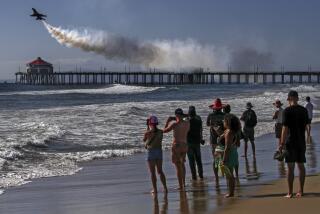Council Seeks Closure of Oil Terminal : Environment: Huntington Beach officials petition the State Lands Commission to shut down the mooring site where February’s spill originated.
- Share via
HUNTINGTON BEACH — The City Council announced Monday night that it will ask the State Lands Commission to shut down the offshore oil loading terminal where a giant oil tanker impaled itself on its own anchor Feb. 7, dumping 394,000 gallons of Alaskan crude on the city’s beaches.
After a closed-door session, Mayor Thomas J. Mays said each of the seven council members will write a letter to the commission urging that it eliminate the terminal where tankers unload oil for Golden West Refineries, which owns the facility.
Mays also announced that the city will try to get out of its 49-year lease with Golden West and force the company to relocate its offshore operation. The city leases the land for the pipeline that leads from the terminal to the refinery.
The Huntington Beach facility is the only marine terminal in Orange County. The State Lands Commission has final jurisdiction over offshore pipelines.
Council members also said Monday that they will file a formal claim with British Petroleum, which owned the spilled oil, and American Trading Transportation Co., the New York firm that owns the tanker, for $528,000 in unreimbursed cleanup costs. Members further said they are studying the possibility of joining the state in a special damages suit against the two companies.
Mays said the state suit would help the city recoup “long-term costs, such as harm done to the environment and the city’s tourism market.”
“We’ll be pursuing all of these things over the next couple of days,” he said.
No estimates have yet been tabulated for any of those costs, which could include potential income the city lost from parking lots and meters while the beaches were closed, harm inflicted on the environment and wildlife, and marring of the city’s public image.
Representatives for American Trading have said before that they would reimburse cities for expenses directly related to the emergency response and cleanup. However, company officials have yet to state publicly whether they also are willing to pay cities for such additional costs as environmental damage and lost parking revenues.
City Finance Director Dan Villella said the $528,000 represents the city’s costs for police helicopter operations, cleanup equipment and supplies, a film about the disaster, food for employees and volunteers, and overtime and benefits to lifeguards, fire officials and other workers.
In exploring legal avenues, city attorneys have considered as a possible model a 1988 court ruling in which Shell Oil Co. was ordered to pay $19.7 million in damages related to a Bay Area oil spill that year, Deputy City Atty. Robert C. Sangster said.
That decision, stemming from a suit filed by eight government agencies, included a $1.7-million “special damages” settlement to be divided among Solano and Contra Costa counties and the cities of Benecia and Martinez.
More to Read
Sign up for Essential California
The most important California stories and recommendations in your inbox every morning.
You may occasionally receive promotional content from the Los Angeles Times.













